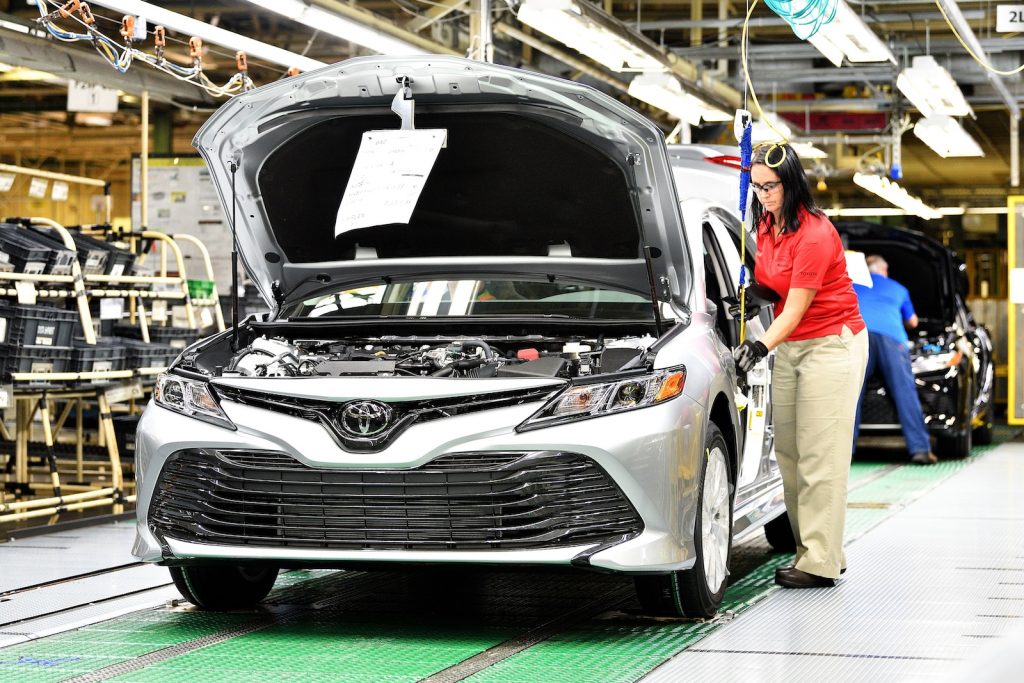TOYOTA

Medium and heavy-duty diesel-powered trucks are responsible for around 40% of global automotive carbon dioxide emissions, as well as a huge amount of particulate pollution. This fact makes the electrification of commercial vehicles a critical path for environmental cleanup efforts.
To help meet this need, Toyota will begin production of hydrogen fuel cell generators at its EV-focused plant in Georgetown, Kentucky before the end of 2023. The company is ramping up a dedicated production line at Toyota Motor Manufacturing Kentucky to assemble integrated dual fuel cell (FC) modules for use in hydrogen-powered heavy commercial trucks.
The cells are designed to allow truck manufacturers to incorporate emission-free electric fuel cell technology into existing platforms with technical support from Toyota.
“We are bringing our proven electric technology to a whole new class of production vehicles,” said Tetsuo Ogawa, president and CEO of Toyota Motor North America. “Heavy truck manufacturers will be able to purchase a fully integrated and validated fuel cell electric drive system, allowing them to offer their customers an emissions-free option in the Class 8 heavy-duty segment.”
What they're doing... The dual fuel cell modules, which are a key component of an overall FC kit, weigh approximately 1,400 pounds and can deliver up to 160kW of continuous power. The FC kit also includes a high-voltage battery, electric motors, transmission and hydrogen storage package from top-tier suppliers.
Toyota will also offer its powertrain integration expertise that will help truck manufacturers adapt these emission-free drivetrains to a wide variety of applications in the heavy-duty truck sector.
“This second-generation fuel cell system is necessary for a carbon-neutral future,” says David Rosier, head of powertrain at Toyota Kentucky. “It offers over 300 miles of range with a total payload weight of 80,000 pounds, while demonstrating exceptional handling, quiet operation and zero harmful emissions.”
Notably, most urban delivery trucks in grades 6-8 work from a central depot and deliver to retail locations within a given metropolitan area. Research by Daimler's Freightliner brand indicates that most trucks working with this method actually travel less than 100 miles a day, making fuel cell and electric heavy truck products well suited to operators' needs.
Toyota Partners with Truck Manufacturers...Toyota's expansion into heavy-duty truck drivelines is consistent with the company's industrial partnerships. In late May, Toyota and Daimler Truck announced their intention to merge Toyota's Hino and Daimler's Mitsubishi Fuso brands and use the combined company to create new electric and fuel cell commercial vehicles.
The merger will also imply the creation of a holding company, with shares divided equally between Daimler Truck and Toyota. Mitsubishi Fuso and Hino will become wholly owned subsidiaries of the new company.
However, each company will maintain its own brand and sales networks in Japan and abroad. The companies plan to finalize the deal by March 2024, with merger details to be finalized by the end of that year. The new company will focus on Asian markets, but the new trucks will be sold globally.
In North America, Toyota Motor North America Inc. and PACCAR, parent company of Peterbilt, Kenworth and DAF trucks, announced an expansion of joint efforts to develop and produce zero-emissions, hydrogen fuel cell (FCEV) Kenworth and Peterbilt trucks powered by Toyota fuel cell powertrain kit engines. state-of-the-art hydrogen fuel, with initial customer deliveries planned for 2024.
PACCAR and Toyota have collaborated on FCEV truck development in recent years, including a successful pilot program that deployed ten Kenworth T680 FCEV trucks in the Port of Los Angeles by 2022. Emission Powertrain certified by the California Air Resources Board (CARB).
Separately, Daimler Trucks has been producing battery-electric trucks in classes 6-8 for several years, oriented towards local and short-distance transport and delivery services. Daimler could become a customer of Toyota's fuel cell powertrains in the future.
Reporter: Jeff Zurschmeide

Nenhum comentário:
Postar um comentário